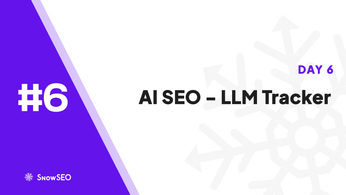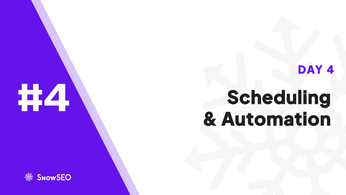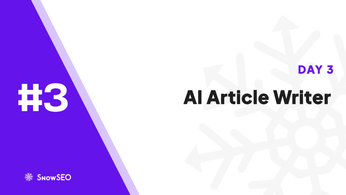
Optimize Content for AI and Search Engines
Table of Contents
The digital realm is evolving rapidly with AI at its core. Understanding how to optimize content for AI is crucial yet often overlooked. Discover top strategies for aligning your content with AI and search engine requirements. Leverage insights from SEO specialists and AI experts, as highlighted by Stanford’s research on AI’s impact and Wikipedia’s overview of search engine optimization.
Artificial Intelligence (AI) is revolutionizing content optimization by enhancing how information is created, structured, and delivered. AI algorithms analyze vast datasets to identify patterns and user preferences, enabling the generation of personalized and engaging content. This approach not only improves user experience but also aligns with search engine algorithms that prioritize relevance and quality.
Role of AI in Modern SEO
In the realm of Search Engine Optimization (SEO), AI plays a pivotal role by automating keyword research, content analysis, and performance tracking. Machine learning models can predict trending topics and suggest content strategies that resonate with target audiences. For instance, AI-driven tools can assess the readability and relevance of content, ensuring it meets both user expectations and search engine criteria. This integration of AI into SEO practices leads to more efficient workflows and improved search rankings.

Core AI Content Optimization Techniques
Optimizing content for artificial intelligence (AI) systems requires a strategic approach that aligns with how AI models process and interpret information. By focusing on semantic clarity, token efficiency, and embedding relevance, content creators can enhance the visibility and accuracy of their material within AI-generated outputs.
Keyword Strategies for AI
Traditional keyword optimization often emphasizes exact-match terms to improve search engine rankings. However, AI models, particularly large language models (LLMs), prioritize semantic understanding over exact keyword matches. This shift necessitates a focus on contextually relevant language and comprehensive topic coverage.
Actionable Steps:
- Semantic Keyword Integration: Incorporate related terms and phrases that provide context to the main topic, enhancing the AI’s ability to grasp the subject matter.
- Natural Language Usage: Write in a conversational tone that mirrors human communication, as AI models are trained on such data and can better interpret naturally flowing text.
- Comprehensive Topic Coverage: Address various facets of the subject to create a well-rounded piece, which aids AI in understanding and retrieving the content accurately.
By implementing these strategies, content becomes more accessible and relevant to AI systems, improving its chances of being featured in AI-generated responses.
AI Tools for Content Enhancement
Artificial Intelligence (AI) has revolutionized content creation, offering tools that enhance efficiency, accuracy, and creativity. These tools assist in various aspects of content development, from research and writing to editing and optimization.
Best Tools for AI Optimization
Several AI-powered tools have become indispensable for content creators:
- Semantic Scholar: Developed by the Allen Institute for AI, Semantic Scholar is a research tool that utilizes natural language processing to provide concise summaries of scholarly papers, aiding in efficient literature review. (en.wikipedia.org)
- SciSpace: This platform retrieves and summarizes literature on specific queries, integrating information from top research papers and extracting key details, thereby streamlining the research process. (pmc.ncbi.nlm.nih.gov)
- Grammarly: An AI-driven writing assistant that enhances grammar, spelling, and style, ensuring clarity and coherence in content. (pmc.ncbi.nlm.nih.gov)
- QuillBot: Utilizes AI to assist users in enhancing, generating, and paraphrasing content, improving readability and engagement. (pmc.ncbi.nlm.nih.gov)
- Zotero: An open-source tool that integrates seamlessly with web browsers, supporting annotation, citation, collection, and organization of references, facilitating efficient research management. (pmc.ncbi.nlm.nih.gov)
These tools exemplify how AI can optimize content creation, making the process more efficient and the output more impactful.

Case Studies: Successful AI Content Integration
Brand Success Stories
National Science Foundation (NSF): The NSF has effectively integrated AI to enhance its operations. In 2023, they implemented ServiceNow GenAI “Now Assist,” a tool that automates content generation for customer service, including responses and knowledge base articles. This integration has significantly improved productivity and service delivery. Additionally, the NSF’s Budget Area Topic Classification Tool employs a pre-trained BERT model to categorize proposals into specific budget areas, streamlining the proposal review process. (nsf.gov)
Wikipedia: To improve AI evaluation, Wikipedia introduced Wikibench, a community-driven data curation tool. This platform enables editors to collaboratively curate AI evaluation datasets, ensuring that AI tools align with the community’s needs and values. The implementation of Wikibench has led to more accurate and community-relevant AI evaluations. (casmi.northwestern.edu)
Higher Education Institutions: A comparative analysis across 26 institutions revealed that integrating AI-generated content (AIGC) tools into curricula enhances interdisciplinary learning outcomes. STEM fields reported an 87% weekly usage rate of AI tools, leading to improved problem-solving skills and knowledge synthesis among students. This integration demonstrates AI’s potential to enrich educational experiences across various disciplines. (pmc.ncbi.nlm.nih.gov)
These examples illustrate the transformative impact of AI content integration across different sectors, highlighting its role in enhancing efficiency, accuracy, and learning outcomes.
Future Trends in AI and Content
Emerging Trends in AI SEO
The landscape of AI in content optimization is rapidly evolving, with several key trends shaping its future:
- Advanced Natural Language Processing (NLP): AI models are increasingly adept at understanding and generating human-like text, enhancing content relevance and engagement.
- Automated Content Generation: AI tools are now capable of producing high-quality content, streamlining the creation process and ensuring consistency.
- Personalized User Experiences: By analyzing user behavior, AI can tailor content to individual preferences, boosting user satisfaction and retention.
- Enhanced Data Analysis: AI’s ability to process vast datasets allows for more informed content strategies, identifying trends and optimizing performance.
These advancements are transforming how content is created, optimized, and delivered, making AI an indispensable tool in modern SEO practices.
Ready to optimize your content for both AI and search engines? Discover how SnowSEO automates SEO, bridges content gaps, and delivers AI-driven growth. Contact us for an AI-focused content audit at snowseo.com today.
Frequently Asked Questions
Q1: How can I optimize content for both AI and search engines?
To optimize content for both AI and search engines, focus on clear structure, relevant keywords, and natural language. Use semantic HTML, answer user intent, and ensure your content is easily understandable by both humans and algorithms. Incorporate structured data, update regularly, and leverage tools like Ahrefs AI and Grammarly for enhanced quality and compliance with evolving ranking factors.
Q2: What role does AI play in content optimization today?
AI helps analyze search trends, user intent, and content gaps, making optimization more data-driven and efficient. It can suggest improvements, automate keyword research, and personalize content for different audiences, resulting in higher engagement and better rankings.
Q3: Are there risks in over-optimizing for AI algorithms?
Yes, over-optimization can lead to unnatural writing, keyword stuffing, and penalties from search engines. Always prioritize user experience and readability while following best practices for AI compatibility.
Conclusion
Artificial intelligence is revolutionizing content optimization, enhancing search engine performance and user engagement. Implementing AI-driven strategies, such as semantic analysis and machine learning algorithms, can significantly improve SEO outcomes. Staying abreast of AI advancements is crucial for maintaining a competitive edge in digital marketing. For instance, AI optimization algorithms have been shown to enhance higher education management and personalized teaching through empirical analysis. (pmc.ncbi.nlm.nih.gov)





